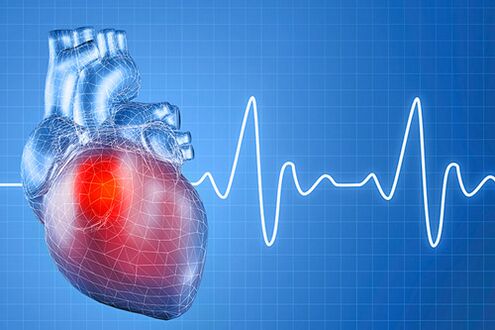
Hypertension is a disease that is accompanied by a pronounced increase in blood pressure. Arterial hypertension destroys blood vessels, and they become narrowed and injured in a short period of time. The vessels cannot withstand the strong blood flow and rupture, causing hemorrhage. An increase in pressure can be observed in patients of any gender, and the causes of the pathology can be very different. Among the main reasons are genetic factors, consumption of large amounts of alcohol, pregnancy and age-related changes.
Factors provoking the development of the disease
Experts say that any deviations from the norm are individual for each patient. Taking into account this factor, in a patient diagnosed with hypertension, the causes and symptoms differ, and are not always sufficiently expressed. For each patient with this pathology, a specific treatment is selected and it is impossible to use any templates.
What can cause a person’s hypertension, and what signs of the disease should one pay attention to? The following risk factors are identified that can provoke the development of pathology:
- Extra pounds on the human body often cause arterial hypertension. This is due to the fact that blood saturation of adipose tissue is a rather complex process. Even gaining just a few extra pounds causes increased stress on the blood supply system and can provoke disturbances in the functioning of the heart and arterial bed.
- Constant stay indoors and a lack of fresh air with the necessary oxygen content can have a negative impact on human health. Vasodilation makes it possible to compensate for the hypoxic mixture from the lungs, and prolonged stay in poorly ventilated rooms causes the appearance of symptoms of arterial hypertension.
- Another provoking factor under the influence of which juvenile hypertension can occur is the growth of testosterone in the body. The result of this is the appearance of signs of the disease and the gradual development of hypertension.
- Frequent stressful situations and emotional stress can cause an increase in blood pressure. With the chronic nature of their course, all organs are in constant tone, and the result of this is wear and tear of the vessels and a decrease in their elasticity.
- Various injuries and damage to the brain can provoke the appearance of hypertension. They cause a narrowing of the lumen of the channel and the body has to actively fight the resulting hypotonicity.

In fact, high blood pressure is detected not only in cases of already existing atherosclerotic changes in blood vessels. The development of hypertension is possible with an increased concentration of cholesterol in the human body, which creates certain difficulties with blood movement. The fact is that cholesterol plaques are an atherosclerotic process.
Etiology and causes of the disease
To prescribe effective treatment, it is important to identify all possible causes of hypertension. It is necessary to establish factors that can subsequently provoke an increase in pressure. The causes of hypertension are quite diverse and continue to be studied by doctors today.
The causes of pulmonary hypertension in patients of any gender and age lie in the narrowing of the diameter of small vessels. Gradually, the vascular walls begin to feel the pressure of the blood, and the consequence of this is the development of hypertension. The etiology of the development of such a disease has not yet been fully studied by specialists. Many experts say that the causes of hypertension are disruptions in the functioning of the circulatory system.
The causes of hypertension in most cases cannot be established, since there can be quite a lot of them. At the same time, we can identify the most common causes of pathology that cause the development of the disease:
- Congenital hypertension.Many diseases are inherited, and hypertension is no exception. In about half of patients, the cause of hypertension is hidden in heredity. If your parents have arterial hypertension, the risk of developing it doubles.
- Poor nutrition.The pathogenesis of the development of vascular diseases can be poor nutrition. Salty foods can cause high blood pressure and cause illness. It will take some time for the kidneys to remove excess sodium from the body and until this happens, the excess salt will retain water. The result of this is the appearance of edema and an increase in circulating blood volume in patients with hypertension.
- Smoking.Tobacco contains nicotine, which increases heart rate and increases blood pressure. Chronic smoking poses a danger to the smoker and everyone around him.
- Alcohol abuse.Drinking large amounts of alcohol and having a morning hangover have a negative impact on health and blood pressure. Statistics show that people under the influence of alcohol often suffer various injuries. Alcohol abuse, starting from a young age, often causes hypertension and many pathologies of the heart and vascular system.
- Many sufferweather dependence, that is, they are especially sensitive to weather changes. Even healthy people who move little and stay indoors for a long time can be weather dependent. Meteocrises in hypertensive patients predominantly develop in unusual climatic conditions.

In case of arterial hypertension, one of the causes is physical inactivity, that is, low physical activity. At the same time, active sports can have negative consequences for the body. Patients with excess weight, pathologies of the heart and vascular system will have to refuse increased physical stress on the body.
Hypertension occurs in 1/3 of the adult population and is predominantly an independent disease. In all other situations with arterial hypertension, the causes lie in the progression of human pathologies of other organs and systems, for example, the lungs or kidneys.
In medical practice there is such a thing as secondary hypertension. The main causes of such hypertension are as follows:
- renal hypertension develops when the arteries that supply the kidneys are blocked;
- adrenal gland tumors appear, causing the production of increased amounts of hormones;
- obesity and metabolic syndrome.
When a person develops hypertension, it is accompanied by the development of certain symptoms. It is important to seek advice from a specialist as soon as the first signs of the disease appear, which will allow timely treatment to begin.
At what age can hypertension develop and the first signs?
Hypertension can begin to develop at a young age, but most often it is detected in patients after 40 years of age. In its development, hypertension goes through several stages and each of them is accompanied by the appearance of certain symptoms. At the initial stage of development of the disease, pressure indicators increase to 140-159 mm Hg. In addition, signs of hypertension may appear as follows:
- headache localized in the temples and back of the head;
- impaired performance combined with a constant desire to sleep and decreased appetite;
- the appearance of spots in the eyes, and especially with a sudden change in body position;
- problems with attention and memory;
- shortness of breath with little physical exertion;
- change in color of the skin of the face.
The first signs of hypertension most often appear rather mildly and disappear after a while. Despite this, it is imperative to seek advice from a specialist, because hypertension can be successfully treated at the very beginning of its development.
As arterial hypertension develops, symptoms of the disease may appear, such as nausea, frequent dizziness, bleeding from the nasal cavity and numbness of the fingers. When hypertension moves to the final stage of its development, the development of complications such as stroke, heart attack, arrhythmia and cardiac dysfunction may occur.
Features of the development of the disease in men
The development of hypertension in women is less pronounced than in men. This pathological condition is tolerated much easier by them and does not cause serious health problems. With the development of hypertension in men, the skin of the face turns bright red already at the initial stage of development of the pathology.
Why is hypertension more often diagnosed in men and not in women? The fact is that representatives of the fairer sex are protected from the development of such pathology by female sex hormones and regular menstrual bleeding. In addition, women are much more attentive to their health than men.
In arterial hypertension, the etiology in men lies in obesity, bad habits, sedentary lifestyle and stress at work. High blood pressure is considered a serious burden on the male body and causes dangerous complications. The stronger sex often develops problems such as angina pectoris, heart attack, stroke and kidney pathologies.
Arterial hypertension poses a serious danger at any age for both women and men. When the first signs of illness appear, you must seek medical help, which will help avoid the development of many complications. To successfully treat hypertension, the symptoms and causes of the pathology should be identified as early as possible and its elimination should begin immediately.






















